Jobless Rate Edges Down as Pay Growth Slows to Two-Year Low
The latest official figures from the Office for National Statistics (ONS) reveal a mixed picture for the UK job market. While the unemployment rate has edged down slightly, pay growth has slowed to a two-year low, raising concerns about the overall health of the economy.
Unemployment Rate and Pay Growth
The ONS reported that the unemployment rate for the three months to July has decreased to 4.1%, down from 4.2% in the previous quarter. This slight improvement suggests that more people are finding jobs, which is a positive sign for the economy.
However, the news on pay growth is less encouraging. Regular wage growth has fallen to 5.1% year on year, marking the lowest level since July 2022. When factoring in inflation, UK workers saw their pay increase by only 3%, down from 3.2% in the previous three months. This slowdown in pay growth could have implications for consumer spending and overall economic growth in the coming months.
State Pension and Triple Lock Guarantee
The rise in total earnings is crucial for determining the state pension increase under the “triple lock” guarantee. This mechanism ensures that state pensions rise by the highest of average earnings growth, CPI inflation, or 2.5%. With total pay growth at its lowest in nearly four years, the planned 4% increase in state pensions next April could face scrutiny and possible revision.
Liz McKeown, director of economic statistics at the ONS, highlighted the impact of one-off payments to public sector workers last year on the current pay growth figures. She noted that while basic pay growth has slowed, the number of employees has continued to grow. This suggests that businesses are still hiring, albeit at a slower pace than before.
Implications for the Economy
The latest labor market figures paint a complex picture of the UK economy. On the one hand, the decrease in the unemployment rate signals improved job prospects for many people. However, the slowdown in pay growth raises concerns about the overall strength of the economy and consumer spending.
With inflation on the rise and pay growth stagnating, households may feel the pinch in their budgets. This could have ripple effects on demand for goods and services, potentially slowing down economic growth in the months ahead. Policymakers will need to closely monitor these trends and consider appropriate measures to support economic recovery.
In conclusion, while the slight decrease in the unemployment rate is a positive development, the slowdown in pay growth raises questions about the sustainability of the UK’s economic recovery. As we navigate the uncertainties of the post-pandemic world, it is crucial for policymakers to address these challenges and support businesses and workers in building a resilient economy for the future.












